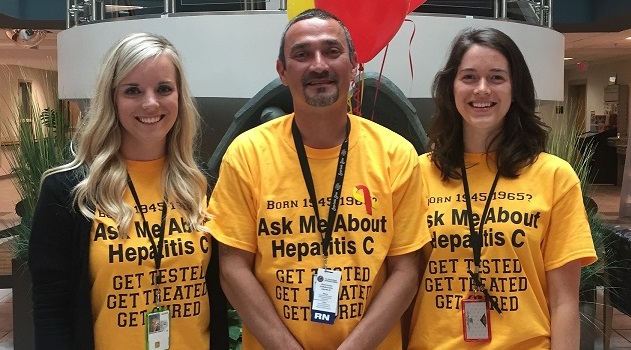May is Hepatitis Awareness Month and VA is getting the word out about hepatitis C testing and treatment. Hepatitis C is a disease that affects the liver. Veterans are at higher risk for hepatitis C and testing is recommended for Vietnam Era Veterans and those born between 1945 and 1965 (full list of risk factors). VA is working hard to get Veterans treated with new medications that are able to cure most people.
Facilities across the VA are implementing innovative strategies to increase testing and treatment. A few of those facilities, Kansas City, Asheville, and Salisbury, shared their accomplishments so far and their plans for Hepatitis Awareness Month with us.
Shannon McFarland is the hepatitis C coordinator for the Kansas City VA Medical Center. She shared their new take on sending out letters to encourage Veterans to be tested for hepatitis C.
“Letter campaigns are nothing new but we wanted to do a fresh take on it so we send out color-printed letters instead of the black and white form letter,” explains McFarland.
For added convenience, Veterans can take the letter directly to the lab to be tested without having to go to an appointment first. After Veterans get their testing done, they can enter a raffle that is done monthly for a Walmart gift card. McFarland also calls patients who are in the birth cohort (born 1945-1965) and have an upcoming primary care appointment to ask if they’d like to be tested when they are on campus. These efforts have helped them increase their testing rates significantly.

The Kansas City team raises awareness.(L-R) Evan Gahan, Pharm D, Sarah Eiker- GI Coordinator, Thelma Agustin- GI Coordinator, Shannon McFarland- Hepatitis C Coordinator, Prashant Pandya- Hepatologist, CC Li – Pharm D
At the Asheville VA Medical Center in North Carolina, they’ve also used letters to help get Veterans in for testing. Michael Sidorovic, the regional Hepatitis Innovation Team lead for VISN 6, reports they also conducted an advertising campaign which included newspaper ads, radio commercials, television advertisements and interviews. They are about to launch a new set of print advertisements this month.
For Hepatitis Awareness Month, Kansas City has many activities planned to increase testing and treatment. Providers will be wearing stickers to encourage people to ask them about hepatitis C. Voluntary Services is helping them put together gift baskets to be raffled off. Staff will be wearing aprons showing where the liver is located, headbands, and sandwich boards to create awareness and hand out information.
Kristen Gallagher, R.N., is the hepatitis C coordinator at the Salisbury VA Medical Center in North Carolina and the co-coordinator for the Hepatitis Innovation Team in VISN 6. Salisbury is also planning Hepatitis Awareness Month events that will get the attention of both providers and Veterans. At the Salisbury VAMC and the surrounding community care clinics, Gallagher and her team are creating costumes that show a healthy liver and a cirrhotic liver that they will wear while passing out information.

Kristen Gallagher and Michael Sidorovic dressed up for Liver and Hepatitis Awareness at the Salisbury VAMC.
These are just a few of the many creative approaches teams across the VA are taking to get the word out about hepatitis C testing and treatment for this year’s Hepatitis Awareness Month.
These impressive efforts are helping VA cure hepatitis C. And it is working. VA has treated over 106,000 Veterans with the new hepatitis C medications and we are close to marking our 100,000th Veteran cured of hepatitis C.
If you haven’t been tested, ask your VA provider about it at your next appointment. If you are hepatitis C positive, learn more about the new effective treatments and get started on treatment as soon as possible.
Learn more: https://www.hepatitis.va.gov/patient/daily/success/index.asp

Topics in this story
More Stories
Seven U.S. Army soldiers, one Army Reserve soldier and two Veterans are representing Team USA at the 2024 Olympic Games in Paris, which begins today.
Study underscores important role COVID vaccination can have in protecting Veterans from infection and reducing long-term health consequences
Columbia VA’s robotic surgery teams completed their 800th robotic surgery and are on schedule to hit 1,000 by the end of the year.







I am very hurt over this information, it has come almost 1 year too late…my husband and l were married in the year 1978, and with our blood test results were drawn we received notice that his blood results were detected that his blood results were irregular, long story short years later he was diagnosed with Hep C, he had a liver transplant, receiving all of the anti-rejection medications, took them for 18 years..in the year 2016, he went to the VA facility and tried the medication that is now given for Hep C patients through the VA and was told he was Hep C cured, no detection of the disease and passed away 1 year later..l am hurt because when l saw the results of a body reaking of Hep C still within his body that ultimately took his life, how could l ever feel that l may have contacted this disease from him, let alone our 2 now adult children along with their children. Seeing him secumbb to this disease after receiving a letter stating that he was indeed Hep C free is an ultimate let down.
Wonderful article and most timely. I’m hearing about HepC a lot more now.
I’m so proud of the VA for vl all they’ve done for me always. I don’t have Hep C, and I move a lot still even being retired. I used v to rarely use v the VA but somehow they always found me and encouraged me to seek them out in every City I was c in and use the VA and know and get all benefits possible.
That has always made the difference and so now I use v them exclusively and two years ago when I got breast cancer they saved my life.
I had once again moved, showed up at the clinic at 3pm newly diagnosed and no doctors at the new clinic. My doctor that day was Dr. Madoni at the Austin , Tx VA Primary Care Clinic. She was shocked at my news for one minute them kicked into high gear and started me on my journey to healing and she said You’re Mine!! I’ll take care of you… And the entire Austin VA did just that.
I had state of the art targeted chemo, I had radiation in the community and I felt valued. And still do.
Needless to say my surgeries and all treatments we a success and I was able to continue raising my granddaughter. She graduated high school this month and on her way to College. This is my dream come true. Thank you VA, Nationwide!!
God bless you all. You all are magnificent caring people.
Good article, with some great information
Misleading title though, getting the word out for Hepatitis month, I have Hepatitis and this is the first that I am hearing of it. There is a disconnect between those who get diagnosed by a doctor and those that are diagnosed by a VA doctor, VA does not track all vets only those who use only the VA, therefore a great many of your vets are untreated and untracked as they are treated at VA only for compensated conditions.